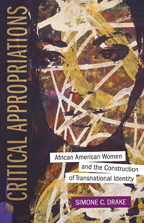From the novels of Toni Morrison to the music of Beyoncé Knowles, the cultural prevalence of a transnational black identity, as created by African American women, is more than a product of geographic mobility. Rather, as author Simone C. Drake shows, these constructions illuminate our understanding of a chronically marginalized demographic. In Critical Appropriations, Drake contends that these fluid and hetero-geneous characterizations of black females arise from multiple creative outlets—literature, film, and music videos—and reflect African American women’s evolving concept of home, community, gender, and family.
Through a close examination of Toni Morrison’s Paradise, Danzy Senna’s Caucasia, Gayl Jones’s Corregidora, Erna Brodber’s Louisiana, and Kasi Lemmons’s film Eve’s Bayou, as well as Beyoncé Knowles’s B-Day album and music-video collaboration with Shakira, “Beautiful Liar,” Drake reveals how concepts of hybridity—whether positioned as créolité, Candomblé, négritude, Latinidad, or Brasilidade—are appropriated in each work of art as a way of challenging the homogeneous paradigm of black cultural studies. This redefined notion of identity enables African American women to embrace a more complex, transnational blackness that is not only more liberating but also more pertinent to their experiences.
Drawing from this borderless exchange of ideas and a richer concept of self, Critical Appropriations offers a rewarding reconsideration of the creative implications for African American women, mapping new directions in black women’s studies.
SIMONE DRAKE is assistant professor of African American studies at Ohio State University.
Praise for Critical Appropriations
“Critical Appropriations makes an indelible mark in moving representations of African American women from the periphery to the center, offering fascinating and thorough discussions that conceptualize their transnational identities through transformation and reconstruction. . . . A valuable and useful publication.”—Tulsa Studies in Women’s Literature
“This is a smart book. It challenges us to move beyond dominant narratives about African American women (and men) and situate their experiences in the context of the emerging field of transnationalism. . . . [This book] deserves serious attention.”—Gender & Society
